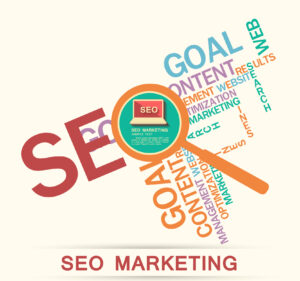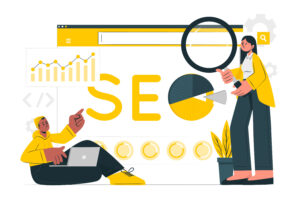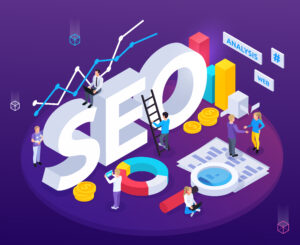SEO stands for search engine optimization, which is the practice of optimizing a website or online content to improve its visibility and ranking in search engine results pages (SERPs) such as Google, Bing, or Yahoo. could The goal of SEO is to increase organic (unpaid) traffic to a website by making it easier for search engines to find and understand your content, and by providing a better user experience.
SEO involves a number of techniques and strategies that can be divided into on-page SEO, off-page SEO, and technical SEO. Let’s consider each aspect:

1.On-Page SEO (Content and Structure)
This refers to the improvements and enhancements you make directly to your website to boost its ranking. On-page SEO includes things like:
- Keyword Research: Identifying words and phrases (keywords) that people are searching for related to your content. These keywords are strategically placed in your content to improve search engine relevancy.
- Content Optimization: Creating high-quality, valuable content that answers users’ questions. This includes relevant keywords in text, headers, images, and URLs. Content should be interesting, informative, accessible, and easy to read.
- Title tags and meta descriptions: These are HTML elements that describe the content of your pages to both search engines and users. A great title and meta description can increase your click-through rate (CTR) from search results.
- URL structure: Create clean, descriptive, and keyword-rich URLs (simplytrove.com).
- Internal linking: Linking to other related pages or blog posts on your website helps with navigation and distributes page authority.
- Image Optimization: Using descriptive file names and alt text for images, which helps accessibility and can also help images rank in search results.
2.Off-Page SEO (External Factors)
Off-page SEO refers to steps taken outside of your website to improve its ranking and authority. The most important factor in off-page SEO is backlinks:
- Backlinks: These are links from other websites that direct to your site in an easy way. Search engines consider backlinks from other sites as “votes of confidence,” signaling that your content is trustworthy and valuable. The quality and quantity of backlinks play an important role in ranking.
- Social signals: Social media activities and shares can indirectly affect SEO. While they may not have immediate impact on rankings, they can boost traffic and increase brand awareness, resulting in more backlinks and greater engagement.
- Brand mentions: Even without direct links, mentions of your brand or website on the web (in forums, news articles, or blogs) can positively affect your site’s authority.

3.Technical SEO (Site Infrastructure)
Technical SEO focuses on the technical aspects of a website that affect search engine crawling and indexing. This includes:
- Mobile Friendly: More users access websites from mobile devices than desktops, so search engines prefer mobile friendly websites (Responsive Design). Google also uses mobile-first indexing, meaning the mobile version of your site is considered the primary version.
- Site Speed: Faster loading times improve user experience and can positively impact rankings.
- Google considers page speed as a factor in its ranking algorithm.
- XML Sitemap: This is a file that lists all the important pages of your website, helping search engines find and index them more efficiently.
- Robots.txt: This is a file that informs search engines which pages they are permitted to crawl and which ones they should avoid. It helps you control which parts of your site appear in search results.
- SSL certificate: Websites with an SSL certificate (making the site HTTPS instead of HTTP) are considered more secure by search engines and can improve rankings.

4.Local SEO (For Local Businesses)
If your business operates in a specific geographic area, local SEO helps your website rank higher for location-based searches. Key strategies include:
- Google My Business: Setting up and optimizing your Google My Business listing helps your business appear in local search results and Google Maps.
- Local Referrals: Listing your business on local directories and making sure your name, address, and phone number (NAP) is consistent across the web.
- Customer Reviews: Encouraging customer reviews (especially on Google) can help your business rank higher in local searches.
Why is SEO Important?
- Increased visibility: SEO helps your website appear in search results when people search for related topics or products. The higher your site’s rank, the more likely users are to click through to your website.
- Organic Traffic: SEO helps generate organic (free) traffic to your website, as opposed to paid traffic from advertisements. Over time, SEO can lead to constant traffic without incurring costs.
- Cost-Effective: Unlike paid advertising, which requires constant expenditure, SEO can deliver long-term results without additional investment once properly optimized.
- Credibility and Trust: Websites that rank at the top of search results are often viewed as more credible and trustworthy by consumers, resulting in higher levels of trust and conversions.
How Do Search Engines Rank Website?
Search engines use complex algorithms to determine which websites to display in response to a user’s query. The main factors influencing the ranking include:
- Relevance: How well your content matches the user’s search intent (ie, does it answer their question or solve their problem?).
- Authority: Your site’s authority is often determined by backlinks. A site with high quality backlinks is considered more authoritative.
- User Experience (UX): Factors such as page speed, mobile friendliness, and how easy it is to navigate your website.
- Engagement: Metrics like bounce rate, time on page, and click-through rate can give search engines an indication of how well users are interacting with your content.

How to Use SEO to Make More Money with Your Website
1.Understand Your Audience and Their Search Intent
- Why it’s important: SEO starts with understanding your audience’s needs. If you know what your audience is looking for, you can create content that answers those questions and solves problems, leading to more traffic and more engagement.
- Actionable tip: Use tools like Google Analytics and Google Search Console to analyze the keywords people are searching for and what queries bring them to your site.
- Search Intent: Determine if the intent behind the search is informational (looking for answers), transactional (ready to buy) or navigational (trying to find your website).
2. Do Keyword Research to Find High-Value Keywords
- Why it matters: Keyword research helps you identify the terms your target audience is searching for. These keywords should be relevant to your business, your goals and the intent of your audience.
- Actionable tip: Use keyword research tools like Ahrefs, SEMrush, or Ubersuggest to find keywords with low search volume and competition. Focus on long-tail keywords (for example, “Easy Ways to Become Millionaire From Home“) because they are less competitive and more targeted.
- Actionable tip: If you want to sell something or increase conversions, prioritize keywords with transactional intent. If you’re running ads or affiliate links, include keywords like “best [product]” or “review [service].”

3.Optimize Your On-Page SEO
- Why it matters: On-page SEO ensures that search engines can easily understand your content and match it to relevant search queries.
Actionable Tips:
- Title tag and meta description: Include your desired keywords in the title tag and meta description, but keep them compelling to increase your click-through rate (CTR).
- Headings and Subheadings: Use H1, H2, and H3 tags to logically structure your content. Include relevant keywords in these titles to help both users and search engines understand the important points.
- Keyword Placement: Integrate your keywords naturally into the content (at least in the first 100 words) while avoiding keyword stuffing. Google favors content that reads naturally.

4.Improve Site Speed and Mobile Optimization
- Why it matters: Website speed is a ranking factor, and a slow website can lead to high bounce rates, which affects both user experience and SEO.
- Actionable tip: Use Google PageSpeed Insights to check your website’s load time. If your pages take longer than 3 seconds to load, it’s time to optimize.
- Mobile Optimization: Make sure your website is mobile friendly, as mobile traffic continues to increase. Google prefers mobile-friendly websites in search rankings.
5.Create High-Quality, Valuable Content
- Why it matters: Content is king in SEO. Search engines prefer high-quality, informative, and engaging content that satisfies user intent.
- Actionable Tip: Write blog posts, guides and articles that solve problems for your audience. Use a combination of text, images, infographics and videos to make the content more engaging.
- Content Length: Longer, more detailed content ranks better. Aim for 1,500 to 2,500 words per post, especially for “pillar” content that targets high-volume keywords.
- Actionable tip: Don’t just focus on the text. Add multimedia elements such as videos, charts and diagrams to keep visitors engaged for longer, which helps reduce bounce rates and improve rankings.

6.Build High-Quality Backlinks
- Why it matters: Backlinks (your links from other websites) are an important ranking factor. They act as a vote of confidence for your content, signaling to search engines that your content is valuable and authentic.
Actionable Tips:
- Guest Blogging: Write guest posts for authoritative sites in your niche and add a link back to your website.
- Broken Link Building: Find broken links on other websites in your niche and offer your content as an alternative.
- Influencer Outreach: Build relationships with influencers and bloggers in your field, and ask them to link to your content if it’s relevant to their audience.
7.Optimize for Local SEO (If Applicable)
- Why it’s important: If you run a local business or website that caters to a specific geographic area, local SEO can help you attract more local traffic.
- Actionable tip: Create and optimize your Google My Business listing. Encourage satisfied customers to leave reviews. Use local keywords (eg, “best online marketing services in Gujranwala(“My city name”. You have to write your city name. )”) in your content and metadata.

8.Use SEO Analytics to Track Performance
- Why it matters: In order to improve and optimize your SEO strategy, you need to know what’s working and what’s not. Analytics help you make data-driven decisions and adjust your approach.
- Actionable tip: Utilize Google Analytics to monitor traffic, bounce rates, time spent on pages, and conversion rates. See which pages are performing well and which require enhancements.
- Actionable tip: Set up Google Search Console to monitor keyword performance, click-through rates, and any errors that may be affecting your rankings.
9.Monetize Your Website Traffic
- Why it matters: Once you’ve optimized your website and increased traffic, it’s time to figure out how to turn that traffic into revenue.
Actionable Tips:
- Affiliate Marketing: Promote products or services relevant to your audience. Use SEO to drive traffic to your affiliate content and increase conversions.
- Google Adsense: If you have a lot of traffic, consider monetizing through display ads using Google Adsense. Optimize your content effectively to ensure it reaches the relevant and appropriate audience.
- Digital Products/Services: Create and promote digital products (ebooks, courses, guides, etc.). SEO can help bring in targeted traffic that is more likely to make a purchase.
- Sponsored Content: As your traffic grows, brands in your niche can contact you for sponsored posts. This is another way to monetize your SEO efforts.

10.Focus on User Experience (UX)
- Why it matters: Google’s ranking algorithm now takes into account user experience signals, including things like how long visitors stay on your site and how easy it is to navigate.
- Actionable tip: Make sure your website is easy to navigate, has a clean design, and provides a positive user experience. This will help increase retention, increase conversions and improve rankings.
Final Words:
By implementing these SEO techniques, you can greatly increase your website’s visibility , can enhance it, attract more organic traffic, and ultimately make more money and generate a handsome revenue. SEO is not an overnight process. It takes time and constant effort. But once your site starts ranking higher on search engine results pages (SERPs), you’ll start seeing more visitors, more conversions, and more revenue.
So, focus on creating valuable content, optimizing your site for SEO, and optimizing your strategies based on analytics. A combination of smart SEO strategy and effective monetization methods will help you increase your online income.



